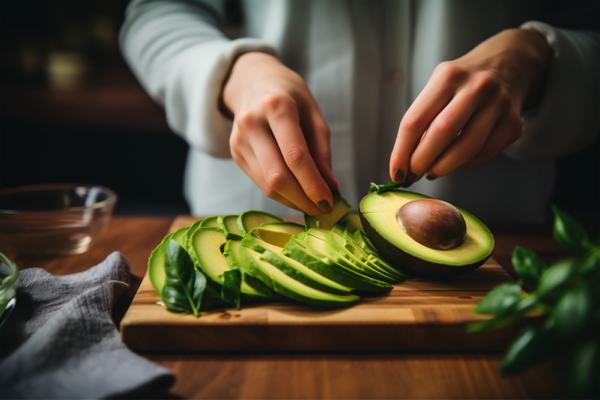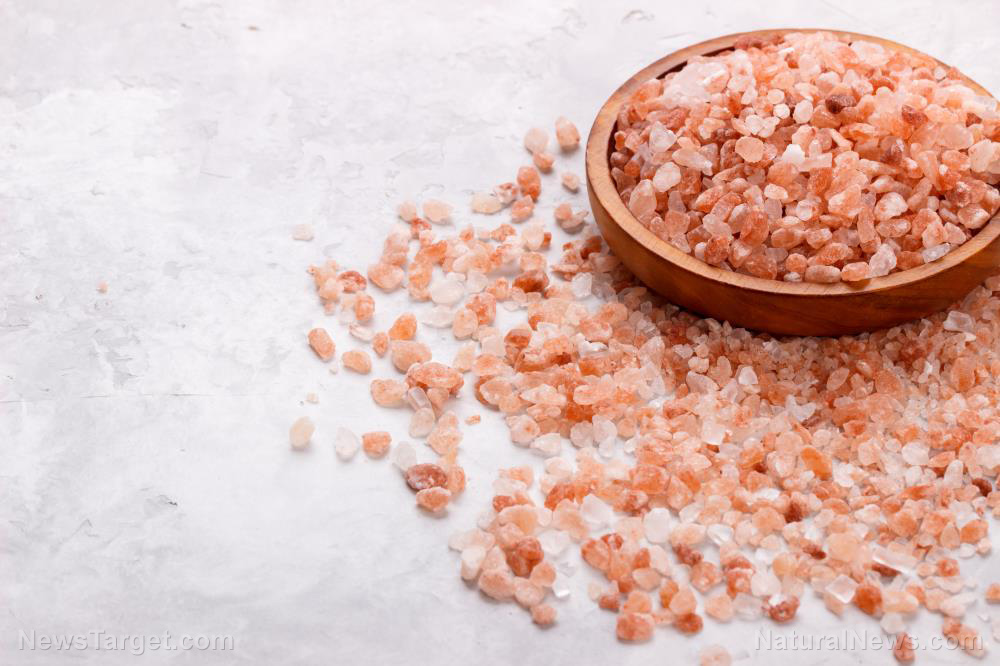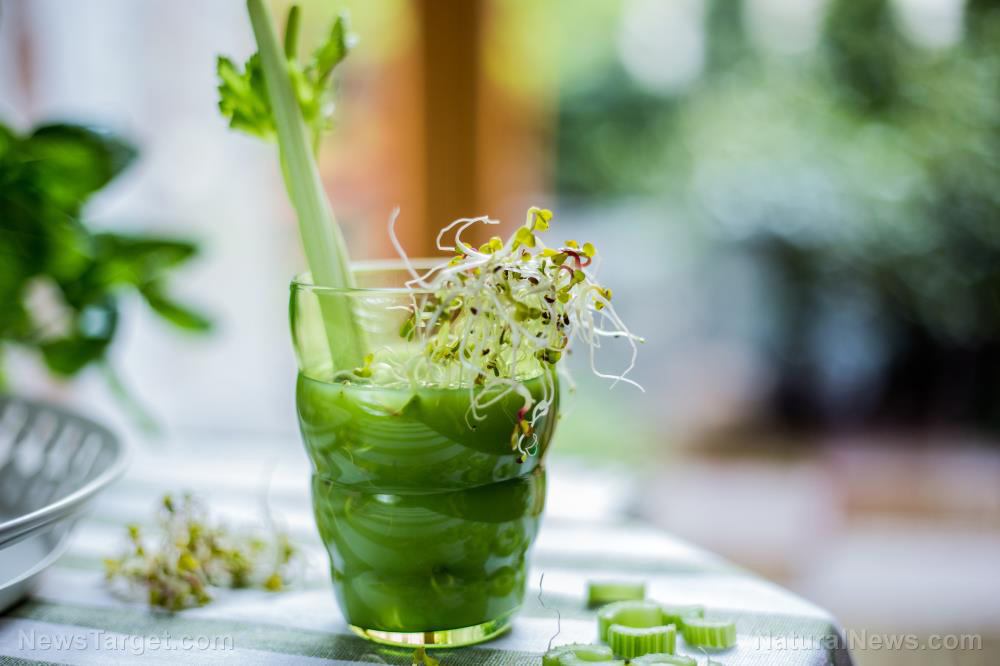Study suggests eating these superfoods can help you live longer
05/09/2024 / By Evangelyn Rodriguez

Over the years, numerous observational studies have reported a strong link between higher intakes of flavonoid-rich foods and a lower risk of chronic disease and mortality.
Flavonoids, sometimes called vitamin P, are polyphenolic compounds commonly found in colorful fruits and vegetables, as well as in plant-based food products like cocoa, tea and wine. These naturally occurring chemicals possess many health-supporting properties, such as antioxidant, anti-inflammatory and even anticancer activities.
In a recent study published in the journal BMC Medicine, an international team of researchers explored how a high-flavonoid diet can impact longevity and found that increasing your consumption of certain flavonoid-rich foods can reduce your risk of early death.
Eat these foods to live a long and healthy life
Flavonoids are some of the most studied bioactive compounds in plant-based foods. They are hailed for their role in protecting against many chronic diseases, which stems from their ability to neutralize free radicals and fight oxidative stress.
Oxidative stress, defined as an imbalance between the levels of oxidants (free radicals) and antioxidants inside the body, has long been linked to the development of chronic disease, primarily due to the irreversible damage it causes on healthy cells and tissues.
As compounds with naturally high antioxidant activities, flavonoids are capable of suppressing disease-causing free radical activity, making them valuable and highly desirable components of the human diet.
While most plant-based foods contain flavonoids, some boast uniquely high concentrations of these phytochemicals. Apples, berries, citrus fruits, dark chocolate, green tea and red wine are some common examples of flavonoid-rich superfoods. (Related: The mighty BLUEBERRY, a superfruit with anticancer properties.)
We are building the infrastructure of human freedom and empowering people to be informed, healthy and aware. Explore our decentralized, peer-to-peer, uncensorable Brighteon.io free speech platform here. Learn about our free, downloadable generative AI tools at Brighteon.AI. Every purchase at HealthRangerStore.com helps fund our efforts to build and share more tools for empowering humanity with knowledge and abundance.
For their study, the researchers looked at the associations between changes in the habitual intake of flavonoid-rich foods and the risk of all-cause and cause-specific mortality. They focused specifically on how eight-year changes in intakes of individual flavonoid-rich foods and the “flavodiet” scores of individual participants affected their longevity. The flavodiet refers to a novel composite measure of flavonoid-rich foods and drinks.
All the data analyzed in the study came from 55,786 American females from the Nurses’ Health Study (NHS) and 29,800 American males from the Health Professionals Follow-up Study (HPFS). These participants were all healthy and had no diagnosis of any chronic disease prior to the analyses.
The researchers reported that between 1986 and 2018, a total of 15,293 and 8,988 deaths were documented in the NHS and HPFS, respectively. Among the flavonoid-rich foods they evaluated, blueberries, red wine and peppers had the most significant impact on total and all-cause mortality risk. (Related: Is eating chili peppers the key to a longer life? Studies link chili consumption to lower risk of dying from heart disease, cancer.)
An increase of 3.5 servings per week in the intake of blueberries, red wine and peppers reduced the participants’ risk of all-cause mortality by five percent, four percent and nine percent, respectively. Meanwhile, an increase of seven servings per week of green tea lowered the participants’ all-cause mortality risk by three percent.
In addition, the researchers found that an increase of three servings per day in the participants’ flavodiet scores was associated with an eight percent lower risk of all-cause mortality and a 13 percent lower risk of death from neurological diseases. This suggests that you could add more to your lifespan and prevent diseases like Alzheimer’s by increasing your daily consumption of flavonoid-rich foods, specifically blueberries, peppers, red wine and green tea.
The researchers noted, however, that some flavonoid-rich foods had a completely opposite effect. In particular, they found that a 3.5 serving per week increase in the intake of onions and grapefruit was associated with a five percent and six percent higher risk of all-cause mortality, respectively. Strawberries and oranges also had a similar effect, suggesting that these foods should be consumed in moderation instead of in high amounts.
Although red wine had a favorable impact on mortality risk, it is still advisable to consume alcohol moderately. The American Heart Association recommends drinking no more than one (4 ounces) to two glasses per day for adult men and one glass per day for adult women. When consumed in moderation, red wine is said to provide cardioprotective benefits, thanks to a non-flavonoid polyphenol called resveratrol that is found in the skin of dark-colored grapes.
Fight obesity with these flavonoid-rich foods
According to research, the average total flavonoid intake in the United States is only about 250 to 400 milligrams (mg) per day — lower than the average intake in the United Kingdom and Australia and about the same as in China and Europe, where the major food sources of flavonoids are tea, citrus fruits and juices, berries, wine and apples. (Related: Study: Citrus fruits can help you maintain healthy cognitive function as you age.)
Because of the many health benefits offered by flavonoid-rich foods, experts believe that increasing the consumption of such foods is one of the keys to improving the overall health of Americans. Statistics show that roughly two out of three adults in the U.S. are overweight or obese; but studies have found that a diet high in flavonoids can help individuals shed extra pounds and maintain a healthy weight.
According to a study published in BMJ, foods that are rich in flavonols, flavan-3-ols, anthocyanins and flavonoid polymers are the best ones to add to a weight-loss diet. To increase your intake of these flavonoids, consider eating more of these superfoods:
Flavonol sources
- Onion
- Kale
- Lettuce
- Tomatoes
- Apples
- Grapes
- Berries
- Green tea
The most studied flavonols are kaempferol, quercetin, myricetin and fisetin, all of which are potent antioxidants that can help reduce your risk of cardiovascular disease. (Related: STUDY: Eating foods high in flavonols (like quercetin) can help you stay strong as you age.)
Flavanol sources
- Green tea
- Cocoa
- Grapes
- Dark chocolate
- Apples
- Pears
- Berries
Also known as catechins, flavanols have been linked to improved blood flow to the brain and better cognitive performance in older adults.
Anthocyanin sources
- Mulberries
- Black chokeberries
- Black and red currants
- Black elderberries
- Blackberries
- Lingonberries
- Strawberries
- Sweet cherries
- Sour cherries
- Red raspberries
- Black grapes
- Plums
- Blueberries
- Black beans
- Red wine
- Red onions
- Purple corn
- Pomegranates
- Eggplants
- Black carrots
- Red cabbage
- Purple cauliflower
Apart from helping reduce inflammation, anthocyanins have been found to reduce one’s risk of Type 2 diabetes and prevent certain cancers.
Flavonoids are remarkable phytonutrients that offer plenty of health benefits, including a lower risk of developing chronic disease and increased longevity. Improve your overall health and wellness and live a long, healthy life by incorporating flavonoid-rich foods into your daily diet.
LongevityScienceNews.com has more stories like this.
Discover the Biblical Diet and how it can extend your lifespan by watching the video below.
This video is from The Daniel Collins channel on Brighteon.com.
More related stories:
STUDY: Taurine is a key nutrient that promotes longevity and good overall health.
Longevity study: Keep moving and keep learning if you want to live longer.
Study: Strength training for at least 30 to 60 minutes a week helps boost longevity.
Live longer and increase your healthspan with these superfoods.
Sources include:
Submit a correction >>
Tagged Under:
aging secrets, antioxidants, Blueberries, fight obesity, flavonoids, food is medicine, food science, fruits, Green tea, health science, longevity, natural health, natural medicine, organics, peppers, phytonutrients, red wine, research, slender, veggie, weight loss
This article may contain statements that reflect the opinion of the author


















